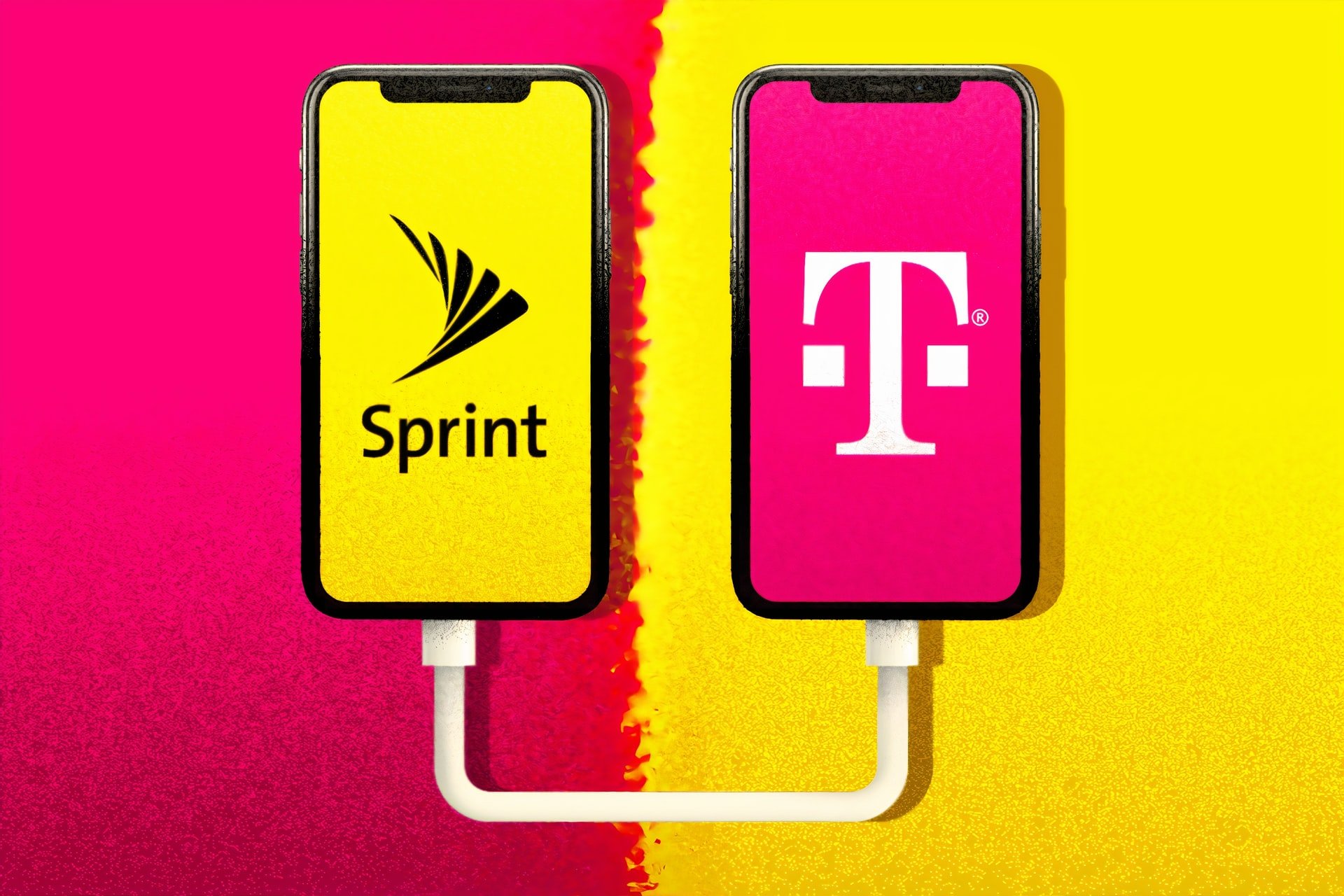Corporate Law: The T-Mobile Sprint Merger
Written by Anna Ramesh, Kurt Striegel, Moksha Davaloor, and Akhil Adusumilli
Edited by Anna Ramesh and Liv Moreno
What is this case?
On April 1, 2020, T-Mobile and Sprint completed their merger. This 2 year process creates the third largest mobile carrier, intended to compete with AT&T and Verizon. This new carrier—still namedT-Mobile—strengthens their services in new locations, using Sprint technology and infrastructure.
The case of the Sprint–T-Mobile merger was decided by Judge Victor Marrero in the U.S. District Court for the Southern District of New York. Even though the deal had received conditional approval from both the Federal Communications Commission (FCC) and the Department of Justice (DOJ) in 2019, a group of state attorneys general, led by the attorneys general in New York and California, filed a lawsuit to block the deal. The states argued that going from three to four major wireless carriers would derail competition, resulting in higher consumer prices and job losses. The case was filed in federal court since it involved antitrust law, having to do with corporate competition and trade at the national level. The Southern District of New York was chosen as a central location to try the claims advanced by various states. Judge Marrero was tasked with determining whether the merger would harm competition or be beneficial to consumers in that it would spur the implementation of 5G technology and improve services.
Merger cases, like this one, are handled as civil cases (rather than criminal cases) under antitrust regulations. At the state level, the civil court system starts small with the Small Claims, and Municipal/County Courts, which handle lower-level disputes. The State Trial Courts handle a very broad range of disputes (such as divorce proceedings, contract breaches, and property/personal injury suits). Any cases that are appealed are addressed by the State Courts of Appeals. Conflicts within the Appellate courts (including but not limited to Conflicts of Law between State Courts, Constitutional issues, Legal precedents, inconsistent decisions, and certain requests for review)then make it to the State Supreme Court.
Criminal cases also deal with a court hierarchy. Like the civil system, criminal courts (at the state level) fall under four tiers: Municipal Courts (which handle smaller criminal misdemeanors), State Trial Courts (which handle felony charges, and include Superior, Circuit, and District Courts), the State Court of Appeals (which, like the civil court system, handle disputes), and finally, the State Supreme Courts. The federal system also follows a hierarchy, going from District Courts to Circuit Courts (or the Courts of Appeals) to the US Supreme Court. The T-Mobile case dealt with five different states, as well as the Antitrust Division of the Department of Justice.
What is a merger?
A merger is a term used when companies absorb into one whole company. The leading company can then control the assets and liabilities (money) from that other company. Mergers happen all of the time in the corporate law world. Mergers are done for many reasons including to gain market share, expand the company and to reduce high operational costs. There are five different types of mergers but the main two that are most important to understand are horizontal and vertical mergers. Horizontal mergers are when companies sell the same product and merge while a vertical merger is when two companies merge but sell different products. The merger between Sprint and T-Mobile would be an example of a horizontal merger since they both sell the same product.
The history of mergers in American corporations can be divided into multiple 'waves' which mark periods in history when there are more merger bids than usual. The first wave took place in 1897-1903, with 3012 deals occurring due to economic expansion and the creation of monopolies (one company or individual supplying a product or service).
A pre-merger is the period where the FTC looks over the merger before it approves it. Tech companies merge to eliminate the competition by combining resources of both companies and to cut down costs. This also opens up their products that they offer.
Regulatory Concerns
In the past, Sprint was bogged down with heavy debt and subscriber losses, while T-Mobile's business was booming with its "Un-carrier" plan, which focused on customer-friendly policies and competitive pricing. In order to become a stronger competitor to AT&T and Verizon, the two companies proposed merging in April 2018. This merger tried to speed up 5G deployment, and the development and availability of next-generation wireless technology. 5G offers faster data speeds, lower latency (reduced communication delay), and the ability to connect more devices at once. A key piece in accelerating 5G was combining their spectrum assets. Spectrum is the range of radio frequencies used for wireless communication, and different bands of spectrum (low, mid, and high) have various pros and cons. Low-band spectrum has great coverage, reaching out to far areas, and is ideal for rural and indoor connectivity; however, it has limited bandwidth and slower speeds. Mid-band spectrum strikes a balance between coverage and speed, supporting urban and suburban areas, though it requires more infrastructure and is prone to congestion due to limited availability. High-band spectrum provides ultra-fast speeds and high capacity necessary for the dense urban core but has very poor range and poor building penetration, requiring expensive dense networks of small cells. Sprint bought a middle-band spectrum-2.5 GHz, offering a happy medium between good speed and wide coverage. T-Mobile had low-band spectrum for extensive coverage and high-band for faster, more localized data. By merging, these companies and their spectrums combined into a far more full-rounded network than either had alone. The merger allowed Sprint to address its debt issues, while T-Mobile could reduce operational costs and use Sprint's resources to expand its network more quickly.
Regulators and critics had argued that the merger, which would reduce the number of national wireless carriers from four to three, would be harmful to competition, raise prices, and cost jobs. The companies argued that the merger was needed to build a nationwide 5G network since skeptics doubted either company could do so on its own. The Department of Justice (DOJ) gave the green light to the merger in 2019, but on one major condition: Sprint had to divest its prepaid assets, Boost Mobile and Virgin Mobile, to Dish Network, a competing company, to create a new competitor. The Federal Communications Commission (FCC) also gave its nod, pointing to the merger's potential for faster 5G expansion. However, 13 states and Washington, D.C. sued to block the merger, citing antitrust laws that would eliminate competition and ultimately hurt low-income consumers. There were even doubts that Dish Network could act as a viable replacement to Sprint as the fourth carrier. The trial took place in December of 2019, and T-Mobile and Sprint highlighted potential benefits-including expanded access to 5G and competitiveness compared to larger carriers. Even if this merger went through with no lawsuit, merging two companies, especially in such industries as tech and telecom, involves several complicated important steps.
First, executives identify potential advantages to the merger , such as gaining market share, cutting costs, or attaining technology and infrastructure. The process then enters due diligence, where financial, operational, and regulatory risks are appraised. After that, negotiations over terms, including who's in charge and what the brand will be, take place, witnessed by T-Mobile after taking over Sprint's brand while retaining some elements of its leadership. Finally, telecom companies have to gain regulatory approval. The DOJ examines whether the merger is reducing competition under antitrust laws, while the FCC makes sure this aligns with policies of spectrum use and the public interest, particularly regarding the advancement of infrastructures such as 5G. Shareholder approval is also required, after which implementation commences by integrating networks, customer bases, and operations. The Sprint-T-Mobile merger was intended to enhance 5G deployment by pooling spectrum resources, making it faster and more efficient. It sought to create a stronger competitor to AT&T and Verizon while reducing operational costs by eliminating redundancies. Other parties played critical roles. Into the marketplace comes Dish Network as a new entrant to acquire Sprint's prepaid brands, Boost and Virgin Mobile, owing to conditions set by the DOJ. Many state attorney generals and some consumer groups opposed the merger, contending it would harm competition, particularly for low-income subscribers. This balancing regulatory process has to weigh the goals of business enterprises against consumer protection. Benefits such as expanded 5G networks come at the expense of market competition and affordability.
This will set up all of the plans that T-Mobile and Sprint have including plans for customers and its products/ product deals. T-Mobile will also have control over the company and its finances because they are the larger company.
Works Cited
Department of Justice "Justice Department Welcomes Decision in New York v. Deutsche Telecom, the T-
Mobile/Sprint Merger." 2020. Office of Public Affairs | Justice Department Welcomes Decision in New York v. Deutsche Telecom, the T-Mobile/Sprint Merger | United States Department of Justice. February 11 . https://www.justice.gov/opa/pr/justice-department-welcomes-decision-new-york-v-deutsche-telecom-t-mobilesprint-merger.
Feiner, Lauren,. 2020. "Judge Approves $26 Billion Merger of T-Mobile and Sprint." CNBC. CNBC. February
11. https://www.cnbc.com/2020/02/11/sprint-soars-after-judge-approves-its-merger-with-t-mobile.html.
Hargrave, Marshall. 2024. "Merger: Definition, How It Works With Types and Examples." Investopedia.
\Investopedia. Accessed December 8. https://www.investopedia.com/terms/m/m erger.asp#:~:text=
A%20 ho rizontal%20merger%20is%20when,AT%26T%20and%20Time%20Warner%20combinatio
Justice Department Settles with T-Mobile and Sprint in Their Proposed Merger by Requiring a Package of
Divestitures to Dish." 2019. Office of Public Affairs | Justice Department Settles with T-Mobile and Sprint in Their Proposed Merger by Requiring a Package of Divestitures to Dish | United States Department of Justice. July 30. https://www.justice.gov/opa/pr/justice-department-settles-t-mobile-and-sprint-their-proposed-merger-requiring-package.
Limbong, Andrew. 2020. "T-Mobile Completes Takeover of Rival Company Sprint." NPR. NPR. April 1.
https://www.npr.org/2020/04/01/825523250/t-mobile-completes-takeover-of-rival-company-sprint.
Lipscombe, Paul. 2023. "T-Mobile Faces Lawsuit over Its $26bn Sprint Merger." All Content RSS. November 7.
https://www.datacenterdynamics.com/en/news/t-mobile-faces-lawsuit-over-its-26bn-sprint-merger/.
"Merger." 2024. Legal Information Institute. Legal Information Institute. Accessed December 8.
https://www.law.cornell.edu/wex/merger#:~:text=In%20corporate%20law%2C%20a%20merger,called%20a%20merger%20as%20well.
Rash, Wayne. 2024. "T-Mobile Joins The Ranks Of Major Carriers As Sprint Acquisition Closes." Forbes.
Forbes Magazine. November 21. https://www.forbes.com/sites/waynerash/2020/04/01/t-mobile-joins-the-ranks-of-major-carriers-as-sprint-acquisition-closes/.
Scarcella, Mike. 2024. "T-Mobile loses bid to appeal key ruling in Sprint merger lawsuit." Reuters. May 16
2024. 2024. https://www.reuters.com/legal/litigation/t-mobile-loses-bid-appeal-key-ruling-sprint-merger-lawsuit-2024-05-16/.
T-Mobile https://www.t-mobile.com/news/press/t-mobile-sprint-merger-court-win
Wang, Melody, Fiona Scott Morton, and Melody Wang and Fiona Scott Morton. 2021. "The T-Mobile/Sprint
Merger: A Disastrous Deal From the Start." ProMarket. May 9. https://www.promarket.org/2021/04/23/dish-t-mobile-sprint-merger-disastrous-deal-lessons/.

